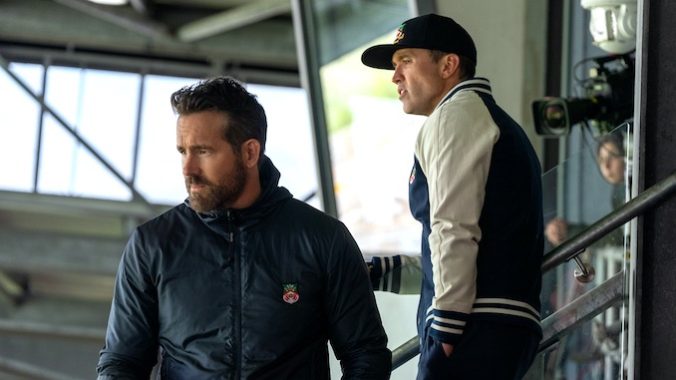Welcome to Wrexham Somehow Surpasses Itself in a Brilliant Second Season
Photo Courtesy of FX
It can be very difficult for American sports fans to wrap their minds around the sentimentality and community of European—and particularly British—soccer. The idea of grown men and women singing songs, of whole towns uniting around a club, and the general sense of camaraderie that seems to flow outward from the club to everyday life is at least a little foreign. (As is the dark side to it all, the capacity for violence, but we’ll put on that hold for a moment.) There is a way in which this hits us in an uncomfortable place, because the tone can almost veer into corny territory, but it’s clearly also something that a lot of people crave, judging by the imitation soccer culture that keeps growing, especially in our cities.
And it occurred to me, watching the fantastic second season of FX’s documentary series Welcome to Wrexham, that this potentially awkward balance is one of the chief challenges that the creators have to navigate from episode to episode. How do you honor the resilient spirit of this Welsh town, whose fortunes had declined in concert with the diminishment of its soccer club, while co-existing with the specifically unsentimental outlook of Ryan Reynolds and Rob McElhenney, the two very funny celebrities who bought the club and made it their goal to restore its former glory?
It was a task they made look easy in the excellent first season, and through the four episodes made available to critics ahead of the second season’s premiere on September 12th, it’s a pleasure to report that they’ve succeeded beyond even my very lofty expectations. A perfect example comes in the first two episodes. At the start, Rob and Ryan are preparing for a short visit from the King of England by taking etiquette classes in Los Angeles, all while trying and failing to weather the British government’s bureaucracy as they seek funding to build a new section of the stadium. (Plus, there’s the whole matter of falling short of promotion out of the National League in year one, and the prospect of being “fucked” if they can’t make it out this time.) Then, in the second episode, the focus shifts to a young fan with autism whose journey parallels the obstacles faced by the autistic son of the team’s star striker, Paul Mullins. From the remote but entertaining detachment of the first episode, we’re plunged into the depths of emotion, and if you’re like me you’re probably going to cry your eyes out—particularly at the stunningly conceived finale.
All elements manage to exist in harmony, which is quite a feat for a show that bounces around thematically in its attempt to detail the competitive ups and downs of the men’s team that is the heart of the project, to profiling the people and institutions of the town itself, which are the heart of the team. From the rise of rival Notts County to the entire episode dedicated to the excellent women’s team who are themselves fighting for promotion, the subject matter merges seamlessly, adding color and drama to the big picture even when it seems far removed. The story of two American stars buying a down-on-its-heels Welsh soccer team and infusing the club and town with renewed spirit is pretty damn good all on its own, but if anything, the near-perfect premise might overshadow the magnificent filmmaking and storytelling on display in the show. By recognizing the potential caprice and novelty of the undertaking—they’re happy to address the cynicism and jealousy displayed for the project by fans of other teams, for instance, and one of the club’s executives, the hilarious Humphrey Ker, refers to Rob and Ryan as “Hollywood jerk-offs”—they reach a kind of truth that dodges the pitfalls of mawkish sentimentality and simply tells a series of incredible stories with a skill that you can only describe with a word like “sublime.”
-

-

-

-

-

-

-

-

-

-

-

-

-

-

-

-

-

-

-

-

-

-

-

-

-

-

-

-

-

-

-

-

-

-

-

-

-

-

-

-








































